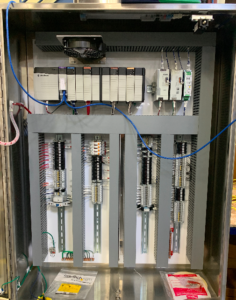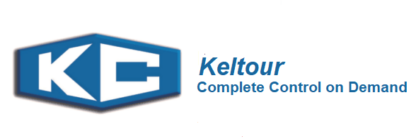Plc Control Panel For A Water Treatment Facility
A PLC panel is a control panel designed for a specific process, housing a PLC (Programmable Logic Controller). This is an industrial computer that monitors inputs, makes decisions based on inputted logic which in turn controls the state of output devices.
What is the purpose of this control panel?
Our current project will be going into a water treatment facility. Essentially, this control panel consists of two main parts:
1. The Main Control Panel
The main control panel is used to monitor the train panels. It consists of an Allen Bradley PLC with 2 CPU’s. The first CPU is for redundancy, meaning that if a single CPU experiences a failure, the operations of the equipment won’t cause any downtime. Also, the main control panel contains a UPS battery powered backup that is used to ensure that the system can properly shutdown in the event of a power failure. The main control panel also includes an HMI programmer that is customized to display the main functions of the panel including the display values, errors and the machine’s status.

2. Two Train Panels
The train panels receive digital inputs and outputs from the main control panel. They have the purpose of using PLC inputs and outputs to actuate solenoids and valves at the correct sequences. Essentially, they carry the responsibility of controlling the equipment nearby.These panels use electrical signals from the PLC as well as monitor input data including the tank level, valves and safety equipment. Also, there are emergency stop buttons located on each of the train panels so the equipment operation can be terminated when necessary.
How do these panels work together?
While working together, the main control panel is typically located in a control room and is considered the powerhouse of the machine. On the contrary, the train panels are located near or on the equipment that is being controlled or monitored. As long as the panels are connected to one another, they can be located anywhere.
Input power requirements and physical attributes
For this particular panel, there are a variety of power requirements and physical attributes to highlight including:
- Power input of 120v with a single phase at 60Hz
- The power inputs can range dramatically depending on the models power requirements and availability
- This particular panel is type 4x and UL certified
- Type 4x panels offer corrosion protection and protection against dust and water ingress
- This panel is typically located outdoors or in locations where these conditions are present
Benefits of the control panel
The greatest benefit of this particular control panel is directly related to its redundancy.
This model is designed so that there is no single failure because anything that could and eventually will fail is backed up. For example, this control panel has 2 power supplies that senses a signal to the PLC. If one of these signals fail, there is a backup to maintain the integrity of the product. Also, if something has failed, the machine will automatically send a signal to the PLC, which will be alerted on the HMI programmer. Because of this, there is little to no downtime in terms of component failure.
The other important benefit of this control panel is that the main panel can remain in a control area or office while the train panels are located near the machinery that they are controlling. Since the main control panel monitors the work of the train panels, technicians can monitor data and faults all from a single location.
Special Features and Designs
One of the greatest additional features that this control panel has is a breather/drain. If there is a difference in internal and external temperatures, this product will likely build up condensation over time. With the implementation of this feature, the drain will automatically drip out the residue to prevent a flood within the machine. This additional feature will improve the lifespan and overall quality of the product.
Keltour is a leader in providing PLC panel solutions. Our staff and technicians have vast knowledge and hands on experience with all the major PLC platforms such as Rockwell Automation, Siemens, Schneider, Modicon, Omron, Wago, Phoenix and more.
